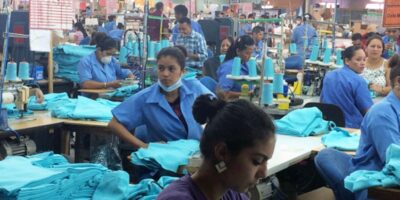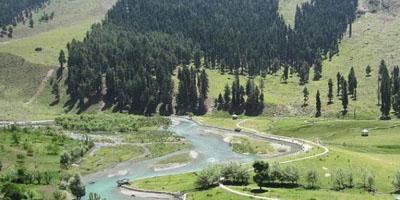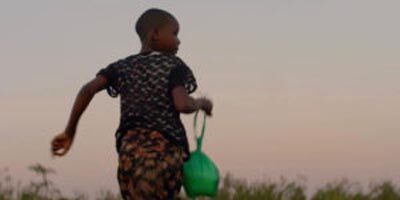
Many North Korean women in China live with local men in de facto marriages, some trafficked into marriage or prostitution. Even if they have lived there for years, they are not entitled to legal residence and face the risk of arrest and repatriation. Many children of unrecognized marriages are forced to live without a legal identity or access to elementary education. (Human Rights Watch 2012) The North Korean woman in this photo is anonymous. Photo: Joseph Ferris.
Mi-Ran Kim says she defected from North Korea to China for the first time when she was thirty-six. Driven by hunger, she crossed the border without the help of a smuggling broker, but was caught and sold to an older man. Refusing to live in a forced marriage, she returned to North Korea.
When Kim escaped again, she was forcibly repatriated to North Korea and sent to a Bowibu prison, a political gulag, where she was beaten, violated and tortured. “While my hands were tied behind my back, they kicked my sides and my breasts,” she said. “I couldn’t even feel the pain because I was losing my mind.”
After one year in the Bowibu, she was transferred to a Gyohwaso, a felony penitentiary, where she remained for three more years. Once released, she again crossed the border into China, and finally made her way to South Korea via Myanmar and Thailand.
Now, although happy with her life in South Korea, Kim is tormented by her past. “I wake up in the middle of the night haunted by my life in the Bowibu,” she said.
Kim told her story at the 10th Annual Conference for North Korean Human Rights and Refugees in Toronto, and shared her feelings on the treatment of North Korean migrants. “I know defection is illegal, but it is truly heartless to treat people that way when all we want to do is survive.”
Driven to flee
In the 1990s, as famine swept through North Korea and millions of people starved, thousands of North Koreans crossed the border into China, often with hopes of making it to South Korea. Now an estimated 300,000 North Koreans reside illegally in China, 80% of them women.
“The North Korean government is not conducive to creating an environment in which these women can freely live and work,” said Joanna Hosaniak of the Citizens’ Alliance for North Korean Human Rights, an NGO in Seoul. Government oppression and the absence of opportunities cause women to look abroad for survival, she says, and smuggling brokers lead them across the border with promises of stable employment and better lives. But most are trafficked into sex slavery.
The One-Child Policy and the demand for trafficked women
Trafficking is a response to the increase in selective abortion and female infanticide in China, according to former director of the Office to Monitor and Combat Trafficking in Persons at the US State Department, Dr. Mark Lagon. “The One-Child Policy has created a deficit of women in the country.”
Dr. Laura Lederer, the US State Department’s former Senior Advisor on Trafficking in Persons, agrees, and says that the male-female gap in China may be as large as 50 million. She says the One-Child Policy has instigated what she describes as a “tsunami of human trafficking.”

Women drying corn. North Korean women are expected to work and contribute to agricultural or industrial production. Photo: Ray Cunningham
“Once you begin these kinds of social engineering policies, or you allow traditional preferences to develop in a certain way, there are sometimes unintended consequences,” she said. “There are whole generations of young men without mates, and they therefore have to look elsewhere.” Lederer says that while some Chinese organizations are addressing the gender gap, the government has ignored the issue, allowing rural men to grow old with no ability to raise families.
“Basically, what the government has said is that they’ll die off and we don’t really care.”
Husbands of forced marriages
Men in the border provinces of Heilongjiang, Jilin, and Liaoning seek North Korean women as mates. The high demand for wives enables profiteers to exploit women, selling them to brothels, karaoke bars, and into forced marriages.
The men who pay for wives are “not the best bachelors in the village,” said Randall Baran-Chong, director of Hanvoice, a Toronto-based organization promoting protection of North Korean refugees. “Many women have been sold to men who can’t find any wives because some of them are highly abusive.”
Women are typically sold for less than 2000 yuan, or about $300, according to Kwandong University professor Won-Woong Lee. That is a high proportion of the yearly income of many of these farmers, so women are often expected to pay off this money through forced manual labour.
Chinese treatment of North Korean refugees
Chinese policy on North Korean women violates the standards of the UN Trafficking in Persons Protocol, a charter that China ratified. The government claims that these trafficked women are not refugees, but illegal immigrants aiming to steal Chinese jobs.
“It is a calamity when those who would flee a country because of its economic chaos and political repression are then, under the less-than-democratic government of China, be vulnerable to coercion.” Lagon said.
“China just denies that it is violating international norms,” he says, “but that is part and parcel of a policy in which China has looked out for the North Korean regime. China has been creating a cushion for this economic basket-case and Stalinist government.”
The Chinese policy of repatriating all trafficked refugees denies women the ability to seek protection from abuse. A Chinese citizen can earn about $500 CAD for reporting an illegal North Korean migrant in to the authorities, so women live in constant fear of being exposed.
Trafficked women are frequently subject to sexual violence, and may be sold and resold many times without legal recourse.
Despite these circumstances, many women take the risk, fleeing multiple times with the hope of remaining in China or fleeing to a third host country.
“Sometimes when you talk to a woman, you find that she may be only eighteen but she already has a child in China and has been trafficked two or three times,” Hosaniak said.
North Korean treatment of repatriated women
Women initially flee North Korea because of bleak circumstances, but are faced with criminal charges upon repatriation.
“Even though the Universal Declaration of Human Rights says that you have the right to leave your country of origin, the North Koreans don’t implement this right,” said David Hawk, former director of the US section of Amnesty International and a North Korean human rights specialist. “It is a technical violation of North Korean law to leave North Korea.”
Repatriated women are sent to detention centres, and if there is a “political” element to their period in China they will be sent to the Kwan-Li-So political labour camps. According to the North Korean government, a political offense can be as simple as meeting a South Korean, or coming into contact with South Korean media. Because this is considered a serious offense, North Korean officials are eager to extract confessions.
“The police interrogators seek to beat the truth out of them,” Hawk said. “People are not given adequate food, and then they are tortured to get them to tell the truth.”
Trafficked women not considered to be political criminals are sent to a Jip-Kyul-So – a shorter term forced labour detention centre. There, women are faced with what Hawk calls “sexual humiliation.” They are stripped and forced to do squat thrusts to expose potential valuables hidden in vaginal and rectal cavities. Any women pregnant with half-Chinese babies are subjected to racially-motivated forced abortions or, if it is too late in the term, the babies are born and then suffocated, Hawk says.
“The violence against women, and against pregnant women who are forcibly repatriated, constitutes a crime against humanity,” he says.
The problem of ineffective policy
The South Korean government provides citizenship to all ethnic Koreans. North Koreans can, in theory, claim citizenship immediately after fleeing the country. While this is the intention of many refugees, it is almost impossible to seek asylum in practice.
“China does not allow NGOs or the UNHCR to operate in the border area,” Hosaniak said.
The UNHCR is ineffectual on the protection of North Korean refugees, officially recognizing only 881 North Korean refugees.
“It is a difficult spot for the UNHCR with China being a Security Council member,” Baran-Chong says. “They are in this legal limbo; they don’t know which way to look. They will often turn a blind eye to the trafficking of women.”
To get to South Korea, women must travel to Beijing or to a third, neutral country such as Thailand or Laos. This is very difficult without the help of smuggling brokers.
“They are not altruistic people; they are not doing this out of the goodness of their heart. They are not the heroes of an Underground Railroad helping smuggle people to freedom. They are profiteers,” Baran-Chong said.
Even if women are able to reach the South, the exploitation does not stop there. Although the South Korean government provides North Koreans with about $30,000 CAD to start their new lives in South Korea, the smuggling brokers often claim large debts are owed them by these women and call them in once the integration process has finished. They thus steal the government bursary, leaving these women with nothing in a new and unfamiliar country.
What Can Be Done?
Governments and NGOs are now focusing on accessing the refugees living in China, hoping to press China to allow the movement of North Koreans to host countries. “To make it to safety in South Korea, the US or Canada is such a low probability,” says Baran-Chong. “To say you’re lucky or say it is a miracle is understating it.”

Vans, buses and trucks have been in use as so-called servi-cha (service cars) in North Korea since the late 1990s, becoming the main system of transportation. The government occasionally cracks down on their use, calling the private-operator system “anti-socialist.” Photo: Ray Cunningham
South Korean governmental and non-governmental organizations have systems of protection and awareness for North Korean refugees, but access to the victims requires them to reach countries that will accept them as refugees
Here in Canada, Barry Devolin, Conservative Member of Parliament and co-chair of the Canada Korea Inter-Parliamentary Friendship Group, has drafted a private member’s motion to encourage the government to work with China to protect North Korean refugees. Although the 2011 election was called just four days before his motion was scheduled for debate, he was re-elected and is optimistic for the future of his motion and its ability to influence government policy and its relations with China.
He hopes to gain unanimous parliamentary support, saying, “If this were to come before Canada’s parliament and pass unanimously, by all members, from east and west and left-wing and right-wing and French and English, that really would be speaking on behalf of all Canadians as a priority.






